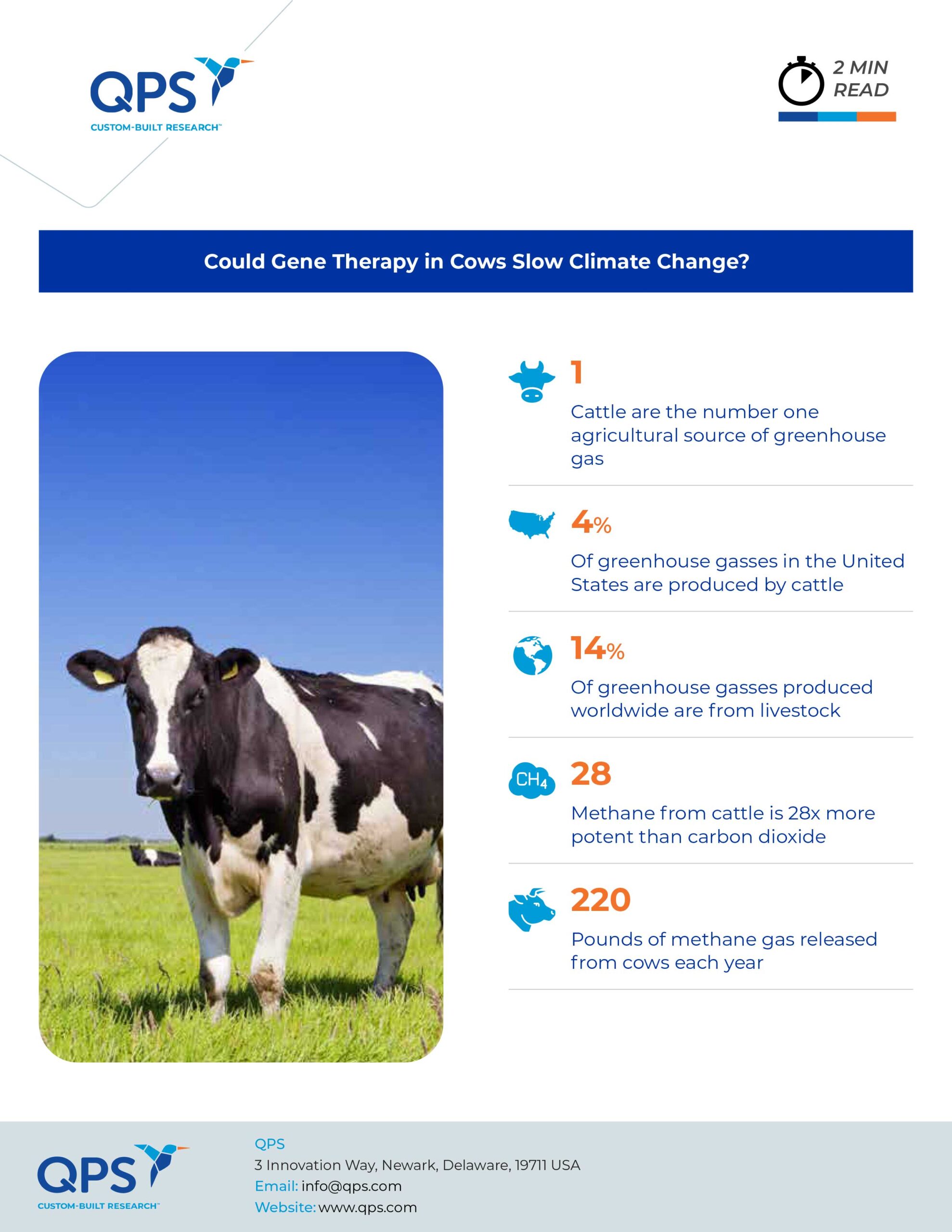Despite the impact of companies like Impossible Foods, which markets plant-based imitation meat products, the demand for beef has never been higher. As of today, there are approximately 1.5 billion cattle on the planet. Additionally, the popularity of beef has risen by as much as 13 percent globally in the last 15 years. Unfortunately, the digestive process of cattle produces large amounts of methane, the greenhouse gas that is responsible for an estimated 30 percent of global warming. With the demand for beef continuing to rise, scientists at the University of California at Davis and the Innovative Genomics Institute proposed a solution. They would embark on a multiyear, approximately $30 million experiment with one goal: genetically altering the digestive systems of cattle. That genetic alteration would, ideally, reduce individual cows’ methane emissions, per The Washington Post. Below, we’ll outline this novel approach to gene therapy.
Applying Gene Therapy to Cattle Digestion
Scientists have long studied the unique digestive systems of cattle, which have multi-chamber stomachs and a rich microbiome. The largest chamber of a cow’s stomach is known as the rumen. In that chamber, bacteria break down sugars into fatty acids, producing both hydrogen and carbon dioxide as byproducts. At that point, single-celled organisms called archaea break down the hydrogen and carbon dioxide, producing methane gas. Cows release the methane by belching, and the impact is serious. The average cow produces around 220 pounds of methane per year. This greenhouse gas stays in the atmosphere for seven to 12 years and is contributing to our planet’s rapid warming. Thus, curbing those methane emissions could slow the rate of warming.
But how to reduce a cow’s methane output? Enter the team of gene editors at the University of California at Davis and the Innovative Genomics Institute. This team is actively working to genetically engineer microbes in the cow stomach, reducing or eliminating methane emissions.
CRISPR Genetic Editing Might Reduce Methane Emissions
There is nothing inherent to cattle that requires them to produce methane. In other words, cows will not be harmed if they don’t produce the gas during digestion. With that in mind, the research team hopes to “turn off” the methane-producing function of the microbes in the microbiome of a cow using CRISPR (clustered interspaced short palindromic repeats) DNA sequencing technology. The team plans to combine CRISPR with an enzyme known as Cas9, which will allow the team to “slice” the digestive microbes’ DNA and replace it with new segments that “turn off” the methane-producing function without interrupting the cows’ digestive function.
The team still has a long way to go, though the research is actively underway. The project started last year, and they hope to begin testing in live cows in the next two years; however, for now, the scientists are still in the early stages of genetically engineering the bovine microbiome. Eventually, the team endeavors to develop an early-life probiotic treatment meant to be administered to calves. If the gene therapy treatment is successful, it could create a lifelong change in the calves’ microbiomes, reducing lifelong methane emissions.
_____
Some may find the link between gene editing and slowing global warming tenuous. However, research like the CRISPR study underway at the University of California at Davis and the Innovative Genomics Institute proves that the impact of genetic modification has the potential to make a global impact far beyond the medical genetic breakthroughs that we are more familiar with.
Did you enjoy this blog post? Check out our other blog posts as well as related topics on our Webinar page.
QPS is a GLP- and GCP-compliant contract research organization (CRO) delivering the highest grade of discovery, preclinical and clinical drug research development services. Since 1995, it has grown from a tiny bioanalysis shop to a full-service CRO with 1,100+ employees in the US, Europe and Asia. Today, QPS offers expanded pharmaceutical contract R&D services with special expertise in pharmacology, DMPK, toxicology, bioanalysis, translational medicine, cell therapy (including PBMCs, leukopaks and cell therapy products) and clinical development. An award-winning leader focused on bioanalytics and clinical trials, QPS is known for proven quality standards, technical expertise, a flexible approach to research, client satisfaction and turnkey laboratories and facilities. Through continual enhancements in capacities and resources, QPS stands tall in its commitment to delivering superior quality, skilled performance and trusted service to its valued customers. For more information, visit www.qps.comor email info@qps.com.








